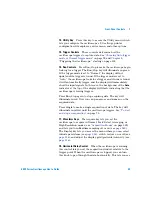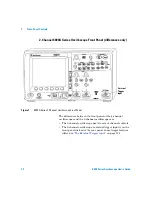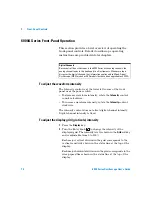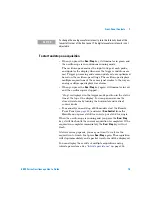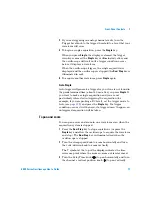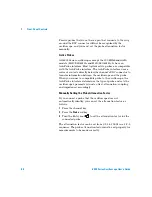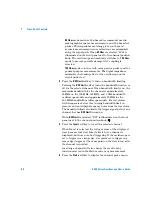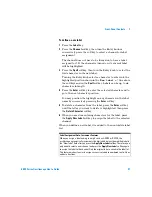
Front-Panel Controls
2
6000 Series Oscilloscope User’s Guide
83
2
Press the channel’s on/off key, then press the
Coupling
softkey
to select the input channel coupling.
Coupling changes the channel's input coupling to either
AC
(alternating current) or
DC
(direct current). AC coupling
places a 3.5 Hz high-pass filter in series with the input
waveform that removes any DC offset voltage from the
waveform. When
AC
is selected, “AC” is illuminated on the
front panel next to the channel position knob (
).
•
DC coupling is useful for viewing waveforms as low as 0 Hz
that do not have large DC offsets.
•
AC coupling is useful for viewing waveforms with large DC
offsets. When AC coupling is chosen, you cannot select
50
Ω
mode. This is done to prevent damage to the
oscilloscope.
Note that Channel Coupling is independent of Trigger Coupling.
To change Trigger coupling see
.
3
Press the
Imped
(impedance) softkey.
The analog channel input impedance can be set to either
1M Ohm
or
50 Ohm
by pressing the
Imped
softkey.
Measurement Hints
If the channel is DC coupled, you can quickly measure the DC component of the
signal by simply noting its distance from the ground symbol.
If the channel is AC coupled, the DC component of the signal is removed, allowing
you to use greater sensitivity to display the AC component of the signal.
N O T E
The input impedance of the MSO/DSO6012A and MSO/DSO6014A/L
(100 MHz bandwidth) oscilloscope is fixed at 1 M
Ω
. Therefore, the
impedance selection is not available on these models.
When you connect an AutoProbe, self-sensing probe, or a compatible
InfiniiMax probe, the oscilloscope will automatically configure the
oscilloscope to the correct impedance.
Summary of Contents for InfiniiVision DSO6014L
Page 2: ...Agilent Technologies Agilent 6000 Series Oscilloscopes User s Guide...
Page 59: ...58 6000 Series Oscilloscope User s Guide 1 Getting Started...
Page 109: ...108 6000 Series Oscilloscope User s Guide 2 Front Panel Controls...
Page 125: ...124 6000 Series Oscilloscope User s Guide 3 Viewing and Measuring Digital Signals...
Page 251: ...250 6000 Series Oscilloscope User s Guide 5 Making Measurements...
Page 287: ...286 6000 Series Oscilloscope User s Guide 6 Displaying Data Interpreting Decoded LIN Data...
Page 321: ...320 6000 Series Oscilloscope User s Guide 7 Saving and Printing Data...
Page 370: ......

